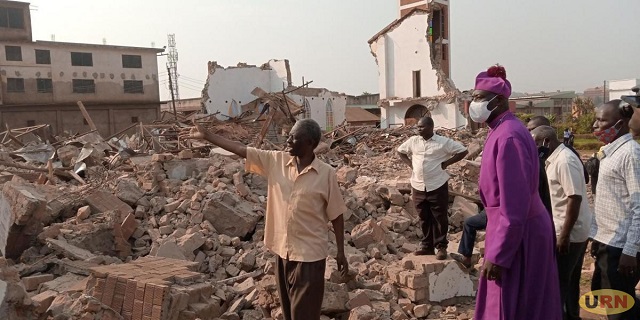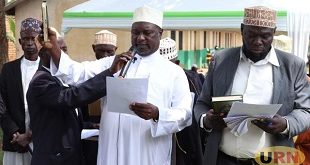
The Church was controversially demolished on 9th August 2020 by court bailiffs on behalf of a Kampala businessman, Dodovico Mwanje who claimed to be owning the land on which it was constructed.
Dodovico Mwanje and several others, including five police officers, a Gombolola Internal Security Officer, and two employees of the Kampala Capital City Authority were subsequently arrested in connection with the demolition of St. Peter’s Church.
This was at the climax of a land dispute involving Mwanje, members of the Buganda Royal Family, and the church.
According to court records, Mwanje is accused of the theft of church properties worth 850 million Shillings, while the police officers and the GISO are accused of abuse of power, corruption, conspiracy to commit a misdemeanor, and disobedience of lawful orders.
The case led to widespread condemnation by the Inter-Religious Council of Uganda, Christians, and political leaders. The demolition caused the arrest of of Police Officers within the Kampala Metropolitan area then commanded by Moses Kafeero.
The Policemen were accused of disobeying lawful orders. It was further suspected that the Police commanders protected the bailiffs while they demolished the church at a time when there were COVID-19 lockdown restrictions.
However, on Wednesday, the Court Presided over by its Chief Magistrate, Joan Aciro heard and received evidence indicating that Moses Kafeero did not have information/documents from KCCA ordering for the demolition of the Church.
The evidence was part of the testimony by then Sgt. Stephen Ouma who worked within the office of Kampala Metropolitan Commander. Ouma has since been promoted to the rank of Assistant Inspector of Police (AIP) AIP, Ouma presented to the Court an internal memo in which Moses Kafeero was distancing himself from the processes leading to the demolition of the church.
“The documents have been brought on my table after a lawless demolition of St Peters Church-Ndeeba has been already done. The church was demolished around midnight on 09/08/2020. Now on Monday 10/08/2020, I see these documents. Yet I cleared my entire table on Saturday 08/08/2020. I left no file on my table on 08/08/2020 by 1600/c,” the court record reads in part.
Kafeero’s memo further read that “I should not be dragged into this evil demolition.”
The memo was submitted to the court as evidence during the testimony of AIP Stephen Ouma, to whom the memo had been addressed. Ouma told the court that on the morning of the church demolition, SSP Rashid Agero, who was then the KMP Field Force Unit commander.
SSP Rashid Agero who is one of the accused persons is said to have arrived at the office with several documents. The documents according to Ouma bore KCCA logos and were about demolition of a structure.
“The letter was not addressed to the office or copied in; therefore, I informally received it without signing or assigning a serial number, as we do with official documents. I then handed it to the secretary of the commander, who placed it on the commander’s desk,” AIP Ouma told court.
He added that throughout the day, the commander Kafeero was not in the office as he was attending a meeting, possibly at the headquarters in Naguru.
“The following day, when I returned, I found the memo addressed to me. I picked up the document together with the memo. Later, when I met the commander, he asked who had brought the documents, and I briefed him. He then ordered me to return the document to SSP Agero,” Ouma explained.
The witness added that he was unable to return the documents to Agero as he never saw him again, but later, he learned that Agero had been arrested and detained. Ouma further stated that when investigators from the State House Anti-Corruption Unit contacted him during the investigation, he narrated what had happened and surrendered the said documents, along with the memo from the commander, to them as police exhibits.
The documents were written by Ivan Katongole, the then Acting Director of Physical Planning at Kampala Capital City Authority (KCCA) granting the demolition of the Church. Ivan Katongole is also one of the accused persons in the case.
The documents dated July 3, 2020, indicated that KCCA had granted permission to Ephraim Enterprise, a city business owned by Dodovico Mwanje, to demolish a structure on Plot 39, Block 7, Ndeeba-Lubaga Division.
During cross-examination, defense lawyer Ambrose Tebyasa asked Ouma why he received the documents informally. In response, Oumo explained that documents not addressed to their office are received informally, and they are not serialized to be given tracking numbers like other official documents.
“…for such documents, we just receive them and give them to a person whom we have been told to. Sometimes friends and relatives send in documents which are not official and not related to official office business; that is how we treat them,” Ouma explained.
He further informed the court that he could not refuse to pass on documents from SSP Agero, a high-ranking officer heading a department at KMP, as it would be considered indiscipline.
When asked whether he had known about the demolition of the church before being given the documents by defense lawyers, the witness answered in the affirmative, noting that by the morning, this was the talk all over FM radios and social media.
The defense lawyers also questioned why the KMP commander was referring to Ouma as an office attendant when this was not his position or appointment at KMP. Ouma is a signaler to the commander KMP by appointment.
He told the Court that he was a signaler and not an office messenger. He however further explained that in the police, immediate supervisors are allowed to give lawful additional work to their subordinates.
He told the Court that the commander, Moses Kafeero assigned him extra duties as the head of all low-rank police officers at KMP and also put him in charge of overseeing the cleaning of his office, among other duties.
The question now is whether Moses Kafeero would have intervened to save the Church if he had been informed of the impending demolition. Further, if the testimony by Ouma is true, why did SSP Rashid Agero conceal the documents and present them to his boss when the church had already been demolished? How did Rashid come into possession of the demolition permit from KCCA? And why was he the one to present to Moses Kafeero?
The Chief Magistrate of the Anti-Corruption Court, Joan Aciro, adjourned the matter to April 26 of this year to allow for further proceedings and the presentation of additional witnesses.
 The Independent Uganda: You get the Truth we Pay the Price
The Independent Uganda: You get the Truth we Pay the Price



